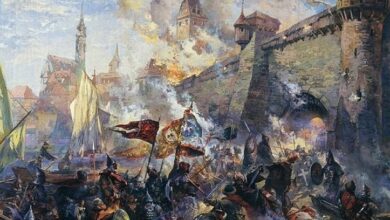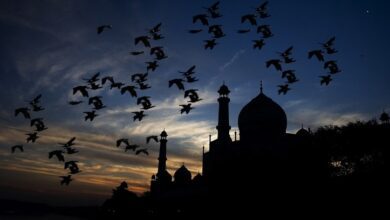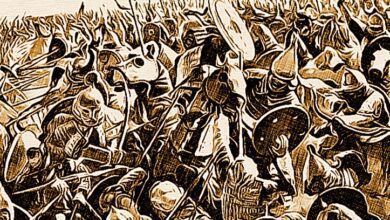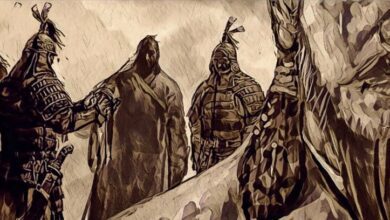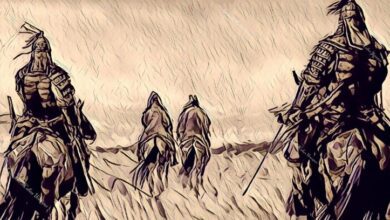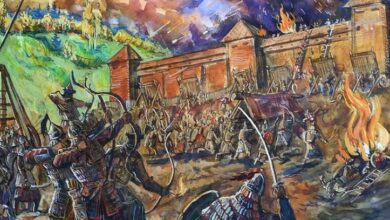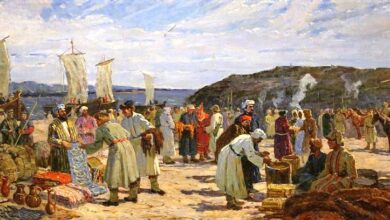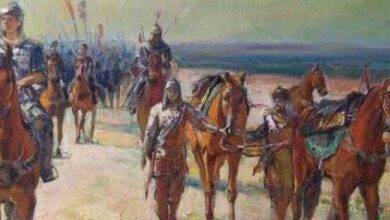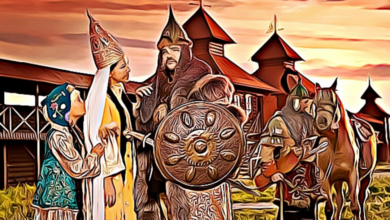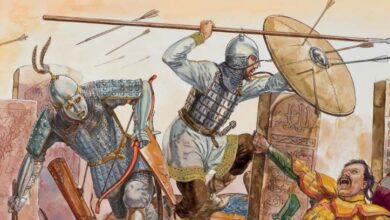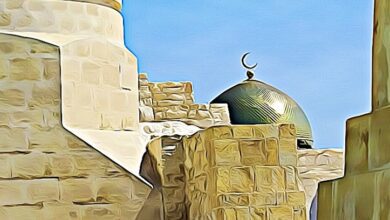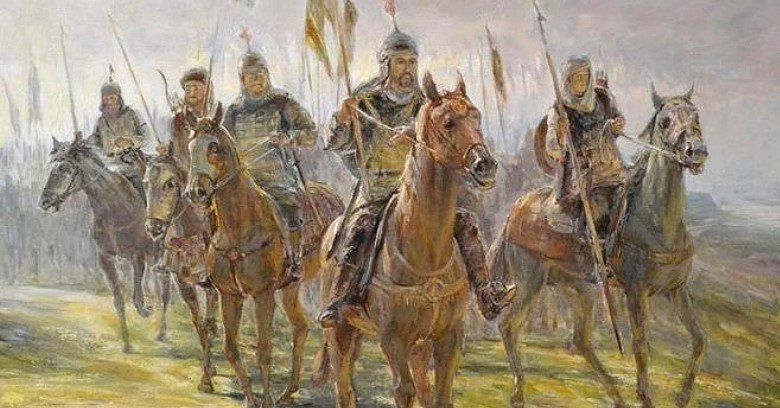
Ghazi Baraj Tarihi. Chapter 13
PAfter the death of Yalkau Mikail Baltavar, who also liked to call himself Arslan, his son Mohammed was raised to the throne. The new Kan hated the affairs of government and preferred various pleasures to them - hunting, harem pleasures, feasts. He turned jieis into pleasure trips, during which he took the most beautiful women and girls as carriers. Since Bakir's son Nasyr, who became a seid and vizier, opposed the manifestations of Kama voluptuousness in Muslim villages, Mohammed preferred to travel in pagan ones. Kazanchis encouraged the licentiousness of the cap and therefore very soon made up his entire entourage. In gratitude for their support, Mohammed removed taxes from them and laid them on the Subashes and Ars. But the treasury was not replenished, because its funds were devoured by the ventures of the cap and his entourage, inexhaustible in inventing new amusements, and by a whole army of officials. State affairs quickly fell into decay, because the Kan did not deal with them at all, and Nasyr, who received the reins of government, was concerned only with the maintenance of his trusted people and the royal court. Insatiable officials were outrageous throughout the country, and there was no one to resist their extortion in excess of the already high taxes and tribute, because the rulers, steadfast in honesty, fled in all directions, and the rest also began to covet.
Meanwhile, Yusuf, with the help of the Kara-Bulgarian troops of Mala, seized the Khazar throne shortly after the campaign of Khum, and Khakan Alan with his Muslim son Daud fled to Bulgar. With the permission of the kapa, they chose Bandzha as their residence, where many Khazar refugees lived and there was even a Khazar balik. And there were still baliks Kura, Burtas, Arbuga, Badzhanak, Samar, Yar, Saban, Khut ... and those towers that adjoined them bore their names. And it was a huge city, in which already under Baluk there were up to 80 thousand inhabitants. And Hadji-Omar in his book "Bulgar Tarihi" wrote that Bandzha, along with Bolgar and Bulyar, belongs to the three most glorious cities of the Bulgar State (Ak Bulgar Iorty) ... And he added that the Bulgar dialect dominated in Bandzha with a strong admixture of Turkmen words characteristic of the Badjanaks and Khazars. And Allah knows that I did everything to save the inhabitants of this city. Most of the saved now live safely on Kinel, in the cities of Yana Samar and Kamysh, and do not get tired of looking for any opportunities to express their gratitude to me ...
Now there are people who reproach me for cowardice, dislike for the fatherland, cruelty and claim that all my actions are committed in order to save my own life or seize power. But I will answer these accusations in another, eternal world, at the judgment of the Almighty; after all, of all the Bulgarian rulers, only I went to Khon-yuly to the headquarters of Batu and Ugyatai in order to stop our war, which was disastrous for the Menkhols and the State. Yes, the end of the war cost the lives of 400 thousand innocent Bulyars and 100 thousand Mardans, but they died through the fault of people who wanted the complete death of both powers in a senseless war with each other.
82
83
Yes, I handed over to our ally, Menkhol, Saksin and Tubdzhak or Seber, completely devastated by the war, but in response, the great Kan handed over to our State Kortdzhak with Kap, Bulymer, Junne-Kala, Balyn and Jir, as well as Shud with its lakes, Dzhuketun and roads, thanks to which we became the owners of the better half of Balyn and the eastern regions of Galidzh ...
In the Alman campaign with Baydar and Urda through Baylak, Almaniya and Maruba to Modjar, I saved from the wrath of these khans - at my own peril and risk - several Kyrgyz, dressing them in the clothes of my warriors who died from wounds. On the campaign, being ahead almost all the time, in skirmishes with the enemy I tried to prevent felling and pursuit, limiting only the shelling of the enemy coming at me and stopping it right there in the event of his retreat. Through one prisoner, I warned the inhabitants of the Baylak capital Misha-Koryk about tomorrow's attack and allowed them to leave the city at night, before the menkhols of Baidar and Urda arrived. It’s not my fault that the khans nevertheless discovered and cut down 35,000 fugitives who carelessly lingered at Misha-Koryk, and the city burned down that night from a fire left by someone ...
I also honestly warned the inhabitants of the alman city of Ber-Aslap about our forced attack in order to obtain everything necessary for the further journey. Most of the inhabitants went to the citadel, and my soldiers took everything without much bloodshed, with the loss of 1 only 11 people, and only in two or three places they fired at the resisting guards with 10 sherejirs and involuntarily set fire to the rabat ...
In the battle with the Misha-Koryk malik near the town of Iglan, I was in the second line of my detachment, when the Menkhols ran and left my 5 thousand Bulgars and 6 thousand Kara-Bulgars face to face with 50 thousand unfaithful dandies, Almanians, Baylaks and Marubays. 1500 infidels - almost exclusively Almantsev and dandies - had the weapons of eastern maliks, 5 thousand - beks, 10 thousand - ulans, and the rest - dzhur. When my shooters discovered that our arrows did not harm the enemy at the usual distance for hitting, I ordered the uhlans to withdraw behind our camp, protected by several rows of wagons, and after a single successful volley of shooters point-blank directed my line of medium-armed Bashkorts, Baityubins, Kara-Bulgars in a spear blow. This blow stopped the infidels, but in the felling that began after this, ours began to yield step by step. I was in the thick of the battle, and Ablas-Khin and Naryk barely snatched me, already wounded, from under the swords of seven baylak knights and took me to the camp. Seeing that it would not be possible to keep the infidels in the middle line, I took her outside the camp and placed on both sides of his fresh ulans and the Menkhol Turkmen and Kyrgyz who came to our rescue. Clumsy, in very heavy armor, the infidels stumbled on the wagons, and ours began to easily shoot them from the second and third lines of wagons point-blank with ordinary bows, and the "iron arrows" prevented the enemy from trying to bypass the camp. When the corpses of the enemies exceeded the height of the wagons, I ordered the lancers to strike at the spears, and this blow of the ghazis finally overturned the infidels. I watched with delight how, from the blow of the heavy Bulgar spears tied to the horses, the infidels overturned along with the horses. I also heard the cries of the enemies being cut in half by the axes of bakhadirs... Mine were taken in this battle, in which there were no prisoners on both sides, 820 of the king's, 3 thousand of the beks and 6 thousand of the uhlan armor, not counting the Djur ones. Only when the infidels fled did Baidar and Urda return to the battlefield to rob and finish off the fugitives...
When the Menhols, in need of supplies, stopped near one of the Marubai cities, I, as always, stood apart from them at a decent distance from the city and saved my entire army from destruction. In a night sortie, the Marubays and Almanians finished off 10 thousand menkhols and Baydar, and Urda, shaking with fear for this miscalculation, with 5 thousand surviving menkhols, was deprived of my armor and placed in the center of my army for his own salvation. I added Turkmens and Kyrgyzes to my bakhadirs. When two Marubay sardars - the killers of Baydar - Yusuf and Yakub - decided to pursue us, they fell into my ambush near the city I took without a fight ... and parted with their heads along with 12 thousand of their soldiers. After that, it was enough for the ghazis to show the heads of the unfaithful sardars, the inhabitants of the Marubai cities, and without further ado they took out everything we needed to advance. Only on the right bank of the Sula, an ambush of 7,000 Almanians awaited us - but, anticipating it, I sent Ablas-Khin to arrange a false crossing and crossed with the whole army to another place. Ablas-Khin died with 200 of his Khins, but he knew that this could happen, and he went for it himself. I avenged his death by taking by surprise and slaughtering all those Almanians. All my soldiers drove into Batu's headquarters near Lake Balatun with spears, each of which had the head of an infidel on it ... I returned to Bulgar with half of my soldiers, and Batu with a tenth of my army ...
But was it really a desire for power that in 1242 I voluntarily gave up the throne to my son and went to build a barn for the Kypchak Khan Batu? I was appointed as the ambassador of the great Kan in Kypchak and did everything so that this region would eventually become part of the State, like Khazaria. Even when returning from the Alman campaign, at my suggestion, Cossack troops from the Anchians and Kara-Bulgars began to be created in Kypchak, and it was I who gave them the name, because they refused to take the nickname of their mercenaries, which was pleasing to the Menkhols - "Tatars". In the future, this would be our backbone.
84
85
I resettled the Turkmens and Kyrgyz who surrendered to me near Bashtu and who had been with me in the Alman campaign to Dzhalda and created from them and the Dzhaldai Bulgars who left the Rumian service the Korym army, also loyal to me.
I resettled our people in the Saksin cities and in every possible way prevented the Khorezmians from resettling here, so that this part of Kypchak would remain ours. I tried to place our people, including the Saxins and Tubdzhaks, in all important posts in Kypchak... In 1240, I saved the Bolgar from destruction by the menhols who came to my aid and pardoned the rebels. Why are my accusers silent about all this? And all this can not be seen only by those who deliberately do not want to see ...
Alan's family was completely safe in Banjo, which cannot be said about those who remained in Khazaria. The Cumans of Yusuf roamed the Khazaria and killed in place of all possible contenders for the Khakan throne. Then, among others, Muslim Mukhtasar, the son of Modjar and brother of Alan, was killed in the city subject to him. (a sworn brother; Blutsbruder, hermano carnal, fratello di sangue, frère de sang etc., all these terms ascend to the brotherhood rutual ingrained in the Türkic history and literature, an oath of brotherhood between two individuals that make them allied bothers - in contrast with first brothers who may be bitter enemies — the oath ritual includes drinking a mix of their own blood and exchange of names. Unlike the regular Türkic names, which are temporary and change in time and status, the blood brotherhood names remain permanent names — Translator's Note). This atrocity aroused the indignation of the Khazar Burtases and Burdjans. Then the Samanids, fearing the accession of Khazaria to the Bulgar, made their protege khakan, the son of Modjar Ugez-bek or Uzbek. The mother of Uzbek was the daughter of the Turkmen Khan Kuruk, who served the Samaiids. The son of this Kuruk Gali, having received the order of Khorasan to place an Uzbek in Itilo, first of all lured Alpamysh, the faithful servant of Bulgar, from the banks of the Djam or Umbet river. Aliamysh succumbed to Gali's persuasion to serve the Samanids for some time, because his possessions could no longer feed everyone due to the multiplication of the Turkmens. With half of his people and with his eldest son Yunus Bakhta, he went to Khorezm, leaving his son Mikail on the other. In Khorasan, Gali immediately seized Alpamysh by deceit and did not remove his chains until his death. And he ordered Yunus, together with Mikail, to fight with Bulgar. And Yunus and Mikail accepted Islam in Bulgar. It was shortly after the reign of Yalkau on the river Vakhta, as the captain ordered to call the river Shepshe because of the abundance of wild fruit trees on it. Therefore, Yunus took the nickname Bakhta. Being a zealous Muslim, Yunus, in response to Gali's proposal, tried to hit him with a club, but the Khan's servants prevented him. Gali did not dare to kill Yunus, because the Samanid emir decided to save his life in order to counteract the too strong Gali. But in exchange for their life and the life of their father, both Yunus and Mikail were forced to agree to their participation in the campaign against Khazaria under the command of Gali's son Kubar. In 944 they captured Itil and installed Uzbek as khakan, under whom Kubar became a bek.
Yusuf and Mal fled to Kara-Bulgar, but clever Kubar decided to deal with them with the help of Ugyr Lachyn. His ambassadors conveyed to Ugyr that the khakan would not oppose the capture of Kara-Bulgar by Ugyr if the Ugyr Ulubiy decides to do so. And in Kara-Bulgar then there were many cities - Khorysdan, Khursa, Seber, Kharka, Saltau, Challi and others, and Ugyr was very happy with the opportunity to master the rich land. In order to provoke a war with Khorysdan, he demanded tribute from Mal. He agreed with this and gave what was required. Then Ugyr again demanded tribute from him - this time for his wife Uljay. Mal brought it in as well. But Ugyr with his Balyn army from Shamly came to Khorysdan for the third time and demanded tribute already for his son Barys, who was planted by him in Galidzh. This time Mal refused. A war began, in which Ugyr was taken prisoner. Mal's wife, who used to be Ugyr's wife and fled from him because of Uldzhai's intrigues, ordered the ulubiya to be torn to pieces and hung on a tree. The widowed Uldzhay moved to Khorysdan with a new Balyi army from the Galidjians, for the Anchians refused to fight the Bulgars. The Kara-Bulgars split: the baryns decided to continue the war with the Balyns, but the Kaubuys, led by the Ryshtau clan, dissatisfied with the reign of Mal, this time went over to the side of Uldzhay after her promise to keep the Kaubuy reign if they recognized the supreme power of Bashtu. With the help of the Kaubuians, the Balyns captured Khorysdan and captured Mal and Yusuf. When the Balyns put chains on them, Mal bitterly complained to Yusuf: “Truly, the Almighty can change everything in one day! A few months ago I was preparing to take the Bulgar throne, and now I have lost the Kara-Bulgar felt and am in captivity of the Ulaks!”
Uljay, having established the Ryshtau clan in Khorysdan (which she ordered to be called only “Batavyl”), returned with captured beks and baryns to Bashtu. Yusuf was put in prison, and Mal and the ladies were placed in the Almysh Court and ordered the emir to be a stoker in the Uldzhay bath. When Bika entered the bathhouse together with the maid, the emir drove the girl out and took possession of Uljai like a wild stallion. After that, Uljay made Mal the first Urussian bek and kept him, along with his ladies, near her and in the greatest honor. Then our people mockingly said that from the very beginning the emir had to fight with Uljay ... and not with a saber ...
Soon, Batysh ambassadors from the son of Mardan Haddad arrived to Uljay and offered her to marry their bek. Mal, sensing a threat to his position, interrupted the ambassadors and persuaded Uldzhay to start a war with the Batyshians by the forces of the Galidjians and Shamlyns, who hated him. The Galijians and Shamlyns hardly took one of his cities from Haddad and refused to fight further. Then Mal with his mistresses defeated the rebels, and settled those who surrendered in the taken city, which he called Ulak.
86
87
But an unexpected event led to the fall of Mal's power. Uljay, fearing that her connection with the emir would become known and cause outrage, ordered Mal to kill the witness of her sin - a servant. Mal, however, possessed the girl and let her go. Meanwhile, she was the daughter of an Ulchi biy, to whom she told everything. Biy rebelled, demanding that Mal marry his daughter. Uljay decided to take advantage of this opportunity and remove the emir from Bashtu, because she soon began to be weighed down by his own passion, as well as the behavior of the baryns and Anchians of Mala. On the one hand, she often had to interrupt even the advice of the boyars and the receptions of the ambassadors to copulate with her lover right on the throne, on the other hand, the baryns and Anchians almost daily started fights with the Balyns and robbed the Galidzhian and Shamlyn merchants. Therefore, Uljay ordered Mal to become the bek of that region, and he, having easily defeated the bey, sat in his place. Biy, however, was pleased, for Mal preferred to marry his daughter. At the place of the biy's headquarters, the emir built a city, which he called Khorysdan and established a custom according to which his baryns and Anchians could marry any Ulchi girl they liked. Nevertheless, Mal still remained in honor. Ugyr's son Barys married his daughter, and Mal's son, Emir Diu-Baryn, became the first Urussian boyars...
The capture of Khorysdan was a signal for Bek Kubar to start an attack on Bulgar, which the Samanids also wished to make dependent on themselves. However, Khorasan also achieved another goal - to withdraw from its borders the most restless khans of this multiplying people. But Kubar was not a blunder either: he planned to subdue the Bulgars to Khazaria with the sabers of the Samanid Turkmens, and then to climb onto the Itil throne. The war began with the fact that the two brothers of Kubar - Arslan and Shonkar - besieged the Bellak fortress of Samar on the Samar River. Long unaccustomed to such arrogance, the Mardanians hastily and with confidence in an easy victory moved towards Samar, led by Balus. At the fortress, they entered into a fierce battle, but were suddenly attacked from the rear and defeated. The reasons for the defeat should also include the large number of the enemy, timidity and instability of the Kyr-Bajanaks. Balus fell in battle, and his surviving warriors either scattered or retreated in utter disarray and returned to Banju in the most miserable condition. This was followed by a siege, which ended with the exhausted Samarans -'
every single one - both men and women, and old people, and children mounted horses and went to Kinel, where they founded the new city of Samar. They left before dawn, when the Turkmens were overtaken by a deep sleep, so almost everyone made it through. But the loss of this fortress opened the gates for the Oguzes to invade the Bulgar. Aksakals, suvarchs and biys raised Balus' son Bulat to the Mardan throne. The new Emir of Bellak asked Nasyr to cancel the Cape decree on doubling the amount of tribute from Mardan in order to direct funds to increase the salaries of the service bakhadirs and thus raise their morale. But the vizier refused on behalf of the kan, and then Bulat declared to the seid in the greatest irritation: “Since the tribute to you for the maintenance of Cape whores is more important than the security of the state, then receive money and do not demand anything more from me.” After that, he ordered the Badjanaks to open uninhabited roads through Mardap to Inner Bulgaria, and the Turkmens poured into it like locusts. The real "Turkmen flood" began, which lasted 15 years.
The subashes of the Baityubinsk province had the hardest time of all, and they involuntarily took up arms. However, the vizier did not give them any relief in taxes, and then the Bulyars began to meet the officials in the same way as the Turkmens. Officials, having lost the opportunity to plunder the border areas, attacked the others with tripled zeal, despite the desperate cries of the unfortunate igenchis. Many subashes fled from Bulyar, led by Bul, who arbitrarily left his post and occupied the Kashan governor's house by force. The former ulugbek (governor) - the old man Dzhakyn-Mikail, who lived quietly here, gave the province to be plundered by officials and listened with complete indifference to the lamentations of the Igenchis. Of course, the Subash, Chirmysh and Kara-Chirmysh greeted Bul with joy and wanted to slaughter the entire Dzhakyn family, but the new Ulugbek graciously allowed her to leave. Nasyr arranged it in Bulyar, where his sons - first Abdallah, and then Watch - were governors. At the same time, the third son of Jakyn Balak was Vali Tukhchi. In 947, Abdallah successfully repulsed the raid of the Turkmens on Baytyub, and Mohammed, who was afraid of being captured by enemies in his own capital, appointed him Ulugbek of the Bolgar and gave him the personal title of Emir. It was against the will of Nasyr, but the seid was silent. But the ulugbek of Nur-Suvar was his favorite, the son of Hasan and the adopted son of Mohammed Talib. When Gabdulla, as the governor of the capital and the emir, began to mint coins with his own name, the jealous seid immediately ordered his pupil to mint coins. And the coins...
And the state mark and seal on the product were called jogen ...
89
The vizier ordered Bel to get out, but he boldly refused and offered Nasyr double tribute from Kashan in exchange for his approval. To this, Nuretdin added that otherwise he would cut down anyone who dared to cross over to his side through Agidel. Seid, not finding anyone who would dare to poke his nose into Kashan after Nuretdil's threat, reluctantly agreed. Bel easily coped with the payment, since the population of Kashan had tripled due to the arrival of the Bulyars, and he was left alone. Moreover... In the end, Nasyr granted the bek the right to appoint his ambassadors-deputies in the northern Bulgarian provinces of Biysu, Ura and Baigul to oversee the trustworthiness of the local Ulugbeks-Tarkhans and the collection of tribute. The brother of Nuretdin Djilki, so named because he was born in the year of the Horse, himself traveled around these provinces to check the work of the Kashan tujuns. And the northern Tarkhans, at their request and in contrast to the southern or internal ones, were called Yugur-Tarkhans. The Yugur-Tarkhans themselves explained this by the fact that they were called that way from the time of the old Bulyar kingdom of the Khons. By order of Nuretdin, the main fortresses of the province were built.:. Kankura and Kargadan, which was the center of Ur, where northern biys gathered to receive appointments, report and transfer "gift tribute". And the biys from Moskhi and Undzhi gathered in Gusman-Katau on the Dzhuk-su River ...
As for the Sadums who came to Bulgar through Chulman Dingese for permission to trade, Nuretdin received them in Kashan. And they called the Bulgars in Ar and Modjar "Berme", which in their languages means "Bulgar land". And the Sadumians got used to this because upon their arrival in the Bulgar, before the Bulgars themselves, they met our northerners and accepted their name of the state. There were good people among them, but dishonest ones also came across, therefore, until the return of our and Sadum merchants from trips, both Sadum and “ours” left hostages with each other. However, the punishment of the hostages never came. But there were attacks on our Galidzhian Sadumians and Balynian Sadumians. So, once the Ar biy, whose district was located to the north of Moskha-su, betrayed the State and called the Galidjians to him. At the same time, Khalmi's son Dulo, not suspecting anything, was moving towards the lake Koba-kul, which belonged to Bulgar before. Halmi issued permission to trade in Biysu as early as Nuretdin, and all his descendants were engaged in this and were distinguished by honesty and fearlessness. Ours called Halmi "Tash", for halmi in Sadum meant "tash" ("hill"), and in the end he began to call himself Halmi-Tash. When Dulo was already approaching the Koba-su River, which flows into the lake, he was attacked from behind by the Galidjians and their Sadumians, up to 300 people in number. Ours had
50 people, but they utterly defeated the attackers, putting down 150 enemies and losing only two. And 20 Galidjians with two boyars were captured. Kan Timar himself accepted the doulo and told him: “I want such brave men like you to be constantly connected with our land and therefore I give you and your descendants a piece of land.” On this lot, not far from the confluence of the Kara-Idel with the Agidel Dulo, he set up a small fortress and named it in honor of his father - Khalmi-Kerman. Our people called the fortress Tash-Kerman. In addition, Dulo received the honorary name of Baluan from the Kan. As for the traitor-bey, the Kan said: “Do not hold the local Ars by force, for our Power is strong only by good consent and trust, and the use of force in relation to some will undermine this trust and cause fear and desire for betrayal in others.” Therefore, ours began to call the region for Moskha-su “Do not hold”, which is why its Aryan name Totma also came about. But then the Ars themselves drove out the biy-traitor and, as a sign of their loyalty to the State, first built the Shud (Royal) fortress, and then, under Kan Baluk, Balukta. In 1111, the Galidjians, with the help of another biy-traitor, captured these two of our fortresses and began to baptize the local Ars, and when they began to protest, they simply slaughtered them together with the biy's family. Such was the reward of the traitor...
After the transfer of Abdallah to Bolgar, the city of Bulyar became very ill. Nasyr did his best to hide from the Kan the loss of control over Baytyu-boy, where Watch had no real power and did not get out of the citadel of Bulyar - Martuan or Nardugan. This citadel, as some say, was named so in memory of the fact that it was completed in nardugan ... The second part of the city was called Men Bulyar or Undurt Kala, as it was surrounded by a wall with 14 large towers. The third part of Bulyar was called Khinuba (Khynuba). Here, a solid wall was built only after Syb-Bulat by the sugyshy, and it was called that in memory of the first settlers from the city of Khina ...
To make up for the loss of taxes from Baityuba or Chirmyshan, as this il was sometimes called, Nasyr allowed the descendant of Burdzhan-Mar, the merchant Mar, to head the province created from the western lands of the Bulgarian il: after all, this merchant promised to collect double tribute from this territory. Therefore, the new province began to be called Martyuba. Mar settled in the Zyuya-De-ber fortress built by Bul and organized the collection of taxes. He left the Bulgars of the Modjar region, or Mishar, as well as the old and newly arrived Subashes in Chirmysh and Subash, but he turned all non-Muslims into Kara-Chirmysh and began to take a triple Kara-Chirmysh tax from them. The unfortunate pagans, especially the Ars and Serbs, tried to escape, sometimes with their whole families, but the Batlik, Kukdzhak and Modzhar Chirmyshs mercilessly caught them and handed them over to the Ulugbek. jot returned some back, and sold the most recalcitrant to Kazanchis and merchants ...
In the east, the situation was catastrophic. Tamta was half devastated, and in Baityube only a quarter of the lands survived from ruin. The raids of the Turkmens and exorbitant and illegal requisitions ruined subashes, chirmyshs, medium and small merchants and craftsmen. The vizier barely supported the luxurious life of the royal court and his own people by introducing more and more taxes and extortions. Thus, a “farming tax” was introduced for not visiting the districts of the Kan. And at the same time, Mohammed, famous for his capricious disposition, often did not listen to Nasyr's advice and went to the district that had already paid off. And who there could refuse the Kan or complain about the robbery? Complainers simply disappeared ... People used to say that the only thing that the people ate during the reign of Mohammed was anecdotes about the adventures of the Kan. Here is one of those stories.
90
91
Once, Mohammed, traveling with his 2,000-man Kazanchievskaya pack along Martyube, felt unwell and wanted to return. Kazanchis, however, lost their way and, having gone along the deserted military road from Archamysh to the Khazar border, they stopped at the Khazar city of Mukhtasar. It was not surprising to make a mistake: related groups lived on both sides of the border, there were the same customs, and even the rulers were called the same: “khakan”. He ordered the placement of the royal caravan Aksak-Ahmed, a fighter and a bully, about whom there were even more jokes than about the Kan. They say that he, having learned about the appointment of his personal offender Bula to Kashan, came with a complaint about this to the Kan. But Mohammed, pleased with the tribute received by the bek from the northern provinces, yelled that if the Kazan man could beat the same, he would immediately send him to Kashan. The frightened aristocrat, for whom even the governorship in Kashan was a heavy exile in comparison with his luxurious life in the Nur-Suvar patrimony, slowly left ...
92
Immediately after entering Mukhtasar, this Ahmed broke into the tyure of the city with a message about the arrival of “Khakan Mohammed” and a demand to prepare everything necessary. “How, do we already have a new khakan?” - the voivode was quietly surprised to himself, but then, without further ado, he rushed to fulfill the order to deliver food, drink and the best girls and women, including his own wife, from the city to the tent camp of the king. Having drunk, the Kan ordered to show him the women. Seeing them, he went into a complete frenzy. "Who did you bring to me? he yelled at the voivode, giving him plenty of lashes and pointing to Tyure's wife. “Is it women?”
"Why didn't you bring your daughter, whom I saw with you?" Ahmed barked at the governor, interspersing his words with punches.
"Whatever you want to take from me, just don't touch it!" Thure pleaded, falling on his face and kissing the king's boots.
But Kan, having heard about an unusually beautiful gray-eyed dark-skinned woman, was inexorable. They brought the governor's daughter, who was also introduced to Mohammed as a "faithful khakan", and the king, shocked by her charming appearance, asked her:
- Where did you, such a beauty, come from in this garbage dump (as Mohammed called Mukhtasar)?
“I’m not from here at all,” the dark-skinned girl chuckled. - I am the daughter of the Khazar khakan, Aisylu!
- As! Are you Jewish?! exclaimed Mohammed, startled, remembering Bakir's ban on communication with yahuds.
“No, I am a Muslim,” the beauty reassured the king. — My father Khakan-Muslim Mukhtasar brought me up as a zealous Muslim woman. The evil Yusuf killed my father in this city, took my mother into his harem by force and began to harass me too, saying that his adoption of me means nothing, because for the khakan all the women of the country, even his wives, are like his daughters. When I rejected his harassment, they threw me into the tower and began to torment me with hunger and thirst ... And then I fled here with the help of a guard, to whom I gave my golden belt. Thuret, wholly obliged to my father, I ordered to marry me to my daughter and decided it would be better to die in the wilderness and obscurity than to become Yusuf's concubine and a Jew! ..
The king ... decided to immediately get married, fearing Nasyr's chicanery in the capital. “Where does the imam live near you?” he asked the beauty. “We have a mullah far away - ~ in Itil, because we are in Khazaria,” Aisylu answered. Again shocked, Mohammed lashed Ahmed with a whip for rotozey and immediately rode off to the nearest Bellak city of Burtas, where the imam of the Mardan mosque performed nikah ...
But the story didn't end there. Yusuf, having learned about the theft of Aisylu, began to threaten Mohammed with war. But the king did not have a real army. One Akhmed still somehow could hold a sword in his hand, but the Kan then in Mukhtasar interrupted his hand with a whip, and after that he could only bring the ball (bowl) with the ball to his mouth with it. The king called Nasyr and asked him: “What are we going to do?”
- As? the seid was amazed when he learned about the threat of Yusuf. - Has not Alan, but Yusuf, been ruling in Khazaria for a year already? And all this time I sent gifts to Alan and wished him a long life on the throne!
His hands dropped, he trembled and was completely at a loss. I wanted to send my officials on a campaign, but their head fell off the horse with a fright, and, as it turned out, they themselves ate themselves three days ago and since then suffered from indigestion.
93
“Last night I had a dream that pigs undermined the support of the royal tent, and it collapsed,” Nasyr finally said. - As you can see, the dream was in hand - all of us came to an end for our sins!
But then the cana Aisylu came to the rescue: “Yusuf loves to play chess more than his life. Invite him to play and make me a prize!”
- But I'll lose - because I, except for backgammon, do not play anything! Mohammed noted with concern.
~ Nothing! the queen said confidently. — Your adopted son Talib will teach you quickly — he plays the best!
So they did. They sat down to play in a small Bellak tavern in Suz-Uryny, because Yusuf trusted the word of honor only of the Mardans and because the Bellaks refused to provide the players with a larger city for fear of being robbed by the Kan retinue.
Khakan put the city of Mukhtasar against the daughter of Mukhtasar and lost, because Talib gave the king the right game plan. So Aisylu remained in Bulgar, and Talib, the youngest son of Gazan, became a vizier.

